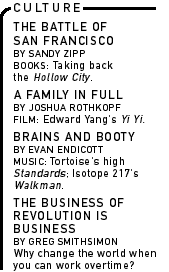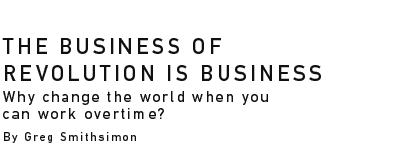

|

|

|

|
| |
|
|
|
Have you been inspired by the excitement of street protests that
swept through Seattle, D.C., Prague, Philly and L.A.? Want to make
those corporations take notice? Want to feel the energy, irreverence
and fun of the coolest global movement since blue jeans? Then Gary
Hamel's Leading the Revolution just might be for you. A no-holds- One hitch before you ask for it at your local book co-op. The jacket promises this to be "An action plan--indeed, an incendiary device" that will "ignite the passions of entry-level assistants, neophyte managers, seasoned VPs, CEOs." Those corporations took notice of the street protests, all right, and decided they were too exciting not to rip off. So steal this book they did. "Activists are the coolest people on the planet," Hamel recognizes, which is dandy as long as he can quietly redefine "activists" to mean people who work extra hard at their job. This Wall Street Journal bestseller assures readers that it's every bit as exciting--hell, every bit as
The book fires up readers with a practical guide on "how to start an insurrection." First you write a manifesto; Thomas Paine's work during the American Revolution is a good guide. Then you build a coalition to maximize your influence, just like "a labor union organizing a strike." Does "pick your targets ... co-opt and neutralize" sound like veteran organizer Saul Alinsky's "pick the target, freeze it, personalize it and polarize it"? It should. Hamel calls Alinsky's Rules for Radicals a "classic." Likewise, "winning small" in the beginning to build momentum might as well have come from an ACORN community organizers' handbook. If executives have paid any attention to the protesters at their doors, they should already know Hamel's game plan. We've been running it against them for years. What's hardest to swallow after reading the book is not that the counterculture has been ripped off yet again, with no royalties paid, or that the determination of environmentalists is presented as inspiration for corporations seeking to extend their dominance over the planet. The tough part is considering the possibility that there's something in here for progressives to steal back and profit from. OK, not much. Leading the Revolution mainly consists of some radical lingo ladled over the same lukewarm hash that's been sold in trendy business books for years. (The formula is for the head of a consulting firm, like Hamel, to write a book that tantalizes potential corporate clients into paying for the full story.) Personally, what I want to adopt is the business world's ability to print whole books in full color with hip graphics. Beyond that, it's time to put corporate platitudes about empowerment into action for ourselves. Hamel's claims that smart businesses "let youth be heard," "listen to the periphery," and "let newcomers have their say" are hype that hide corporate hierarchies. But plenty of good, hardworking NGOs don't use the ideas and innovations of most of their people, either. For starters, groups could try out Hamel's suggestion that half the attendees at the next strategy meeting be people who have never been to one before. Next consider the promise that business makes whenever it talks about workplace "teams" or when Hamel proposes "listening to new voices." They're talking about people having a real say in what their employer is doing. They're talking about workplace democracy. While Hamel, like progressives, recognizes the payoff of giving people a real voice, that's one strategy corporate America can never use. But a genuine, carefully crafted system of workplace democracy could produce for progressive organizations a wellspring of creative new strategies, successful projects and high morale. Back in the corporate world, the next step would be to follow the advice of Hamel's pal Saul Alinsky, and hold companies to their promises. They want suggestions on improving the workplace? Great. Self-managing teams? Here we come. An end to old workplace hierarchies? Couldn't agree more. And a revolution from within the corporation? I'm so there. I'm not sure that Nelson Mandela, Rosa Parks and Martin Luther
King would be the ideal employees Hamel imagines them to be. But
they sure would be fun to sit next to during employee "empowerment"
meetings. To get in touch with the authentic revolutionary vanguard, Greg Smithsimon has temped at management consulting firms.
|


